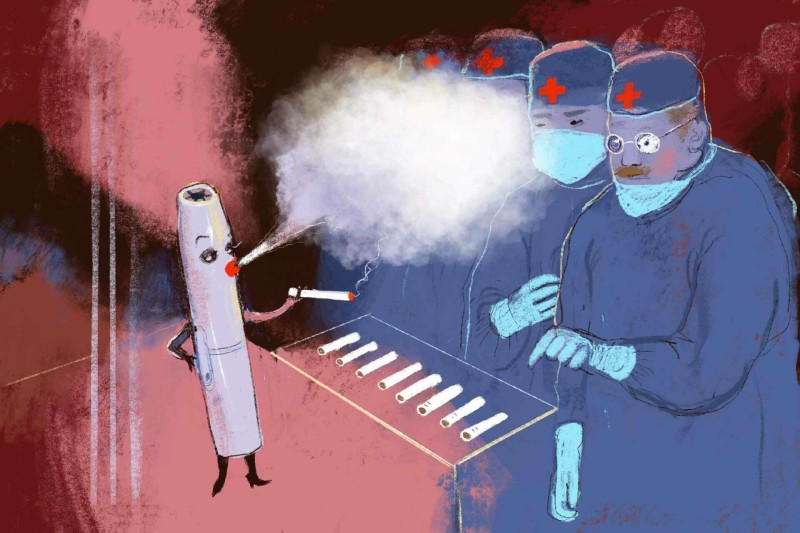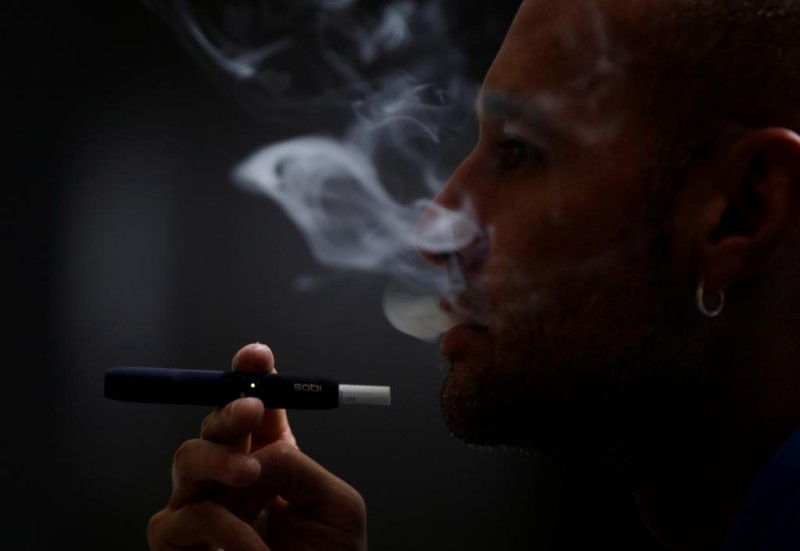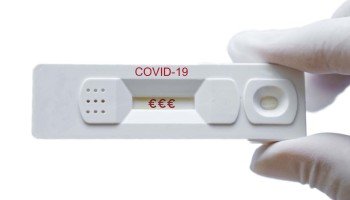On a mild February day last year, two prominent Italian epidemiologists walked into what seemed set to be a mundane meeting at the Tuscany Health Council, a drab concrete building on the outskirts of Florence.
But they were in for one of the most bizarre encounters of their careers.
Giuseppe Gorini and Gianni Amunni of the Institute for the Study and Prevention of Cancer had been asked by a local official to come to the council office. There, they found themselves sitting around a table with three men representing Philip Morris International, one of the world’s largest tobacco companies.
The tobacco reps wanted to show off their new marquee device, known as the IQOS, which uses electricity to gently heat chemically treated tobacco plugs. PMI has been marketing it heavily around the world since its introduction six years ago.
But not just that — they wanted the doctors to endorse it, and tell other doctors to prescribe it to their patients.
“Propose our [alternative] cigarette as a policy to stop smoking,” the PMI officials asked the doctors, according to Amunni, who was taken aback by the request.
The IQOS, the tobacco-company officials explained, was “a valid and effective tool for patients struggling with smoking.” To support their claims, they presented the doctors with a study that showed a lower risk of harm in mice exposed to heated tobacco smoke.
“They asked for a meeting with the region, then also with us, in order to recommend, to suggest to health professionals to recommend to their patients the use of these heated tobacco products — which are produced by this very same industry.”
The men were left aghast by what was clearly a campaign by Philip Morris to gain a medical seal of approval for tobacco products.
“Reality has gone beyond my most paranoid fantasies,” Gorini said.
But while they might have been shocked — and rejected the proposition — academics who study the tobacco industry were not surprised to hear of it.
The effort to sell Italian doctors on the IQOS was just the beginning of what experts predict will be a barrage of similar requests in coming years.
After decades of irrefutable proof that cigarettes cause cancer and chronic heart and lung diseases, the world’s largest tobacco companies are regrouping under the banner of health.
If smoking makes you sick, their reasoning goes, then anything that helps you smoke less should be seen as a healthier alternative.
Enter the IQOS, a pen-shaped device that uses electricity to heat tobacco rather than burn it, yielding a nicotine-rich vapor that feels milder than the smoky pull of cigarettes. The technology was developed decades ago.
Old Technology in a New Package?
But now, with cigarettes heavily taxed and regulated nearly everywhere in the world, the company has placed a newfound focus on heated tobacco systems, investing over $3 billion in research to develop the IQOS. It claims it only wants to target smokers for IQOS marketing, but it has picked up a lot of other users along the way. By PMI’s own calculations, only 10.6 million of the system’s roughly 14.6 million users switched from cigarettes.
“They are trying to ‘cure’ their own disease by switching cigarettes for IQOS, to make money off of the cure,” said Yogi Hale Hendlin, a research associate with the Center for Tobacco Control Research and Education at the University of California in San Francisco.
Hendlin has authored several studies on how the tobacco industry is pivoting to sell their products in the medical sector, a process known as “pharmaceuticalization.” He says a major prong of this push is convincing doctors that IQOS is less toxic than smoking and can help their patients quit.
The holy grail would be getting the IQOS medically certified as a “reduced-harm” or smoking cessation device anywhere in the world, Hendlin says. This would exempt it from tobacco marketing regulations and allow it to be sold just about anywhere, at any time — and smoked anywhere too.
“[I]t allows government certification of these products as somehow approved and legitimate, instead of as socially harmful products,” he said.
But Hendlin says the scientific assertions being put out by PMI are problematic and do not back up the company’s rhetoric.
“Because it takes years or decades to establish reduced harm with chronic disease, they are trying to create studies that work as ersatz evidence, pointing to the fact that IQOS may over the long term be slightly less harmful than smoking cigarettes,” said Hendlin.
Internal PMI documents on the company’s reduced-risk product strategy, exposed by Reuters in a 2019 investigation, reveal exactly that. In one slide from an internal presentation, the company notes in bold that the EU Tobacco Products Directive, which regulates the sale of tobacco across the European Union, does not apply to medicinal products.
Another plank of its strategy is to enlist scientists to make the case for “reduced-risk products,” just as, for years, tobacco companies did for cigarettes.
“Identify and engage competent authorities/expert bodies,” the document reads. “Engage [them] on PMI products and science.” “Build-up network of scientific opinion leaders to provide ‘expert’ voice in discussions.
Philip Morris International denied that it promotes IQOS as a reduced-harm product.
“PMI does not—and never has — promoted IQOS or any smoke free product as cessation devices or medical devices,” said PMI’s Vice President for Strategic & Scientific Communication, Moira Gilchrist, in a statement to OCCRP.
“We have legitimately presented the science behind reduced-risk products at medical conferences, when we were invited, but do not promote IQOS products at these events.”
A Real Rejection
Finding experts to back their case is exactly what Philip Morris did in Italy. Ten months before Philip Morris asked the epidemiologists to endorse its product, the company formally sought permission from the Ministry of Health to claim that IQOS was less risky than traditional cigarettes and emitted fewer harmful substances.
Italy is a key market for Philip Morris as it seeks to promote the IQOS. Cigarette smoking is declining, but the use of heated-tobacco products is on the rise. Today Italy has the third-highest number of IQOS users in the world. The northern city of Bologna is home to a major IQOS factory. Being able to tell Italian smokers that IQOS is a certifably healthier option could open up a huge market for the company.
In support of its claims, PMI sent an 8,000-page package of research — mostly self-authored — to the Ministry of Health. The ministry passed the application to Italy’s National Health Institute, a state institution, asking it to analyze the claims.
Eight months later, in December 2018, the institute returned a 90-page analysis of its own, ending in a clear verdict: there was insufficient evidence that IQOS reduced health risks for users, and PMI could not claim as much.
OCCRP’s media partner Report obtained an exclusive copy of this analysis, which has never before been made public. In it, scientists from the Institute write that the data submitted by PMI is at the very limit of acceptable quality, and by some standards of measurement is unacceptable.
It also points to 12 substances emitted by IQOS that are either carcinogenic or possibly genotoxic, meaning they can change the DNA in cells and cause mutations leading to cancer. It concludes that there is no evidence the aerosol produced by the IQOS is fundamentally any safer than cigarette smoke.
“It is not possible to recognize the harm reduction claim of the [Electrically Heated Tobacco System] EHTSs compared to traditional cigarettes, the use being equal,” the analysis says.
“It was a real rejection,” said Silvano Gallus, a tobacco researcher at the Mario Negri Institute for Pharmacological Research in Milan.
He noted that PMI had its claims rejected on the basis of its own studies, which it had packaged for presentation to health officials, presumably omitting negative results in advance.
More from the Italian National Health Institute Report
The following are excerpts from the NHI analysis of PMI’s research
The National Health Institute’s report remained locked inside the offices of the Ministry of Health. The ministry has refused numerous requests from scientists and anti-tobacco campaigners to release it to the public.
For unknown reasons, the analysis appears not to have been provided to key health ministry officials. Even Giulia Grillo, who was health minister at the time, said she was unaware of the document. The Ministry of Health declined to comment.
Nor was the analysis shared with experts in the field. Amunni — the epidemiologist who attended the February 2019 meeting in Florence where PMI pitched IQOS as a health device — said he only learned afterwards that a state scientific body had already analyzed and rejected PMI’s claims.
But PMI knew. The company had been informed of the negative verdict on January 8, 2019 — before its local lobbying agency, Solving BFM, wrote to the government of Tuscany seeking recognition for the IQOS as “a valid and effective tool for health professionals” and asking for a meeting with local scientists.
A spokesperson for Philip Morris in Italy confirmed that it had “voluntarily submitted to the Ministry of Health a first part of scientific studies and evidence on our non-combustion product IQOS in 2018.”
“We would like to point out that the Italian authorities, unlike what you have reported, considered that such studies, ‘at present and on the basis of the documentation provided,’ were not sufficient to label the product as ‘low toxicity’ or ‘at reduced risk’ compared to combustion products,” the spokesperson said.
“Unlike the Higher Institute of Health, to date, more than ten third-party international government bodies have taken a clear position in recognizing that the IQOS system is able to significantly reduce the toxic substances present in cigarette smoking.”
Despite his dismay at the suppression of the report, Amunni said it was clear to anyone following the scientific literature on tobacco that IQOS is not a proven medical remedy.
“It seems to me that there is no evidence that the use of e-cigarettes, cigarettes with heated tobacco, is a means of quitting smoking,” he said.
‘Handguns for automatics’
A thousand miles to the west, and nearly a year later, it was a Romanian pulmonologist’s turn to be dismayed.
On a cold and soggy day in January, while examining a patient’s lung X-ray against a lightbox, the doctor’s phone dinged with an alert. It was an email from an Irish company the pulmonologist had never heard of
“Dear Professor, We are pleased to announce that we are partnering with a tobacco company (the Sponsor) in a standalone feasibility exploration for their study comparing cigarette smoking to heated tobacco products in adults with mild to moderate Chronic Obstructive Pulmonary Disease (COPD).”
The doctor, who spoke to OCCRP on condition of anonymity, was being asked to recruit sick patients for a study that would ask them to either keep smoking or switch to an unnamed “heated tobacco product.”
“I couldn’t believe it,” the pulmonologist said.
The doctor said emails circulated among colleagues in the medical community who reported that they too had been asked to enroll their patients. Some had been contacted by a different research firm based in the US. None of them knew which tobacco company was behind the study.
OCCRP obtained a copy of the official outline for this study pitched to Romanian doctors. The document reveals that PMI Research and Development is behind the initiative. The “heated tobacco product” in question is IQOS.
The outline listed four authors, including an Italian pulmonologist and a French biostatician. All work for PMI and have been involved in numerous other studies for the company.
The three-year study will divide 2,200 European smokers who are sick with lung disease into two groups, one switching to IQOS and the other continuing to smoke cigarettes. Patients assigned to use IQOS will receive the device free of charge and a starter supply of the tobacco plugs that go inside it, known as Heets.
The goal of the study is “to demonstrate slowing of overall disease progression after 3 years when switching from cigarette smoking to the Tobacco Heating System” for patients with chronic obstructive pulmonary disease. However, experts who analyzed the protocol for OCCRP said there were a number of worrying things about the planned study — including that it is taking place at all.
Given what is already known about the dire health effects of smoking, it may be unethical even to create a study in which some people are asked to keep smoking for three years, said Dr. Anna Gilmore, the director of the Tobacco Control Research Center at the University of Bath.
Most importantly, she said, the justification for conducting it was that an earlier six-month trial on IQOS use among healthy adult smokers in the US had supposedly yielded positive preliminary results. However, Gilmore said that the full results of PMI’s prior study were still not publicly available for experts to assess, even as this new one would be much larger and attempt to build on that evidence.
“It is unethical to set up a three-year study before these six-month outcomes have been made public and fully scrutinized,” she said.
From what is known about the earlier study, lung function continued to decline in patients using IQOS, just “a bit less rapidly than in those who continued smoking,” Gilmore said.
“Ultimately it appears this study is being deliberately set up to demonstrate the benefit of IQOS compared with smoking,” she added. “Given how dangerous smoking is, that is not difficult to achieve.”
Philip Morris International’s response to this story:
Gilmore and Hendlin both pointed to the irony that PMI was only in a position to market IQOS as a medical device because smoking is so bad for you that almost anything would be better.
Hendlin pointed out that cigarettes kill one of every two smokers, and are a leading cause of chronic obstructive pulmonary disease (COPD).
“IQOS will still cause COPD, but it may develop slightly slower than with cigarettes — plainly put, this is their major claim,” Hendlin said after analyzing the new study protocol.
“It’s like giving people handguns to fight with instead of automatic rifles.”
Studies and Claims
On its website, PMI lists more than 80 independent studies written on IQOS. However, a deeper look reveals that many of them deal with topics like marketing and consumer perceptions of heated-tobacco products. At least one is just an outline for a future study.
Only a small fraction of the studies deal directly with the health effects of heated-tobacco devices, and all of these were authored by researchers and specialists who have ties to PMI or British American Tobacco, PMI’s competitor, which is also pushing a signature heated tobacco product.
One of the authors, Riccardo Polosa, received nearly a million euros in funding from PMI in 2017 for a study comparing heated-tobacco products with e-cigarettes, also known as apes, which use nicotine but not tobacco. The Italian doctor is an ardent defender of the concept of “risk reduction” and calls himself “a crusader against smoke.”
But the core of his mission, he says, is to help smokers. He told Report it doesn’t matter where research money comes from as long as it is used for the greater good.
“As Elton John says, ‘I’m still standing,’” he declared. “I am still here, despite all the shit that has happened. I am still here defending the principles for the smoker, for their quality of life.”
Some of these doctors aren’t just writing reports — they’re traveling the world to promote IQOS to their peers.
In Italy, Philip Morris representatives reportedly attended 25 medical conferences in 2018 alone and promoted the IQOS to doctors, university professors, and in some cases to students. PMI Science, which publishes and disseminates the company’s research, was even a main sponsor of the Bologna Medical Science Festival. One of the region’s largest medical conferences, it received over 50,000 attendees that year including university professors and researchers.
In Japan, another critical early market for IQOS and one where it has quickly gained a major market share, PMI has been touting the system’s medical benefits at conferences for years. It sent a “senior scientist for population health modeling” to present at the annual meeting of the Japanese Society for Pharmacoepidemiology, arguing that “introducing RRP (reduced risk products) to Japan could have a net public health benefit”.
And in Romania, a PMI official, Andrei Ghizdavescu, managed not only to attend the National Conference of Oncology, but to give a presentation on “Reducing the risks associated with smoking and the role of new products in this strategy” without revealing his affiliation.
He gave the presentation again in Romania five months later at the National Conference of Family Medicine, which featured the IQOS logo on its webpage as a sponsor. A month later, the same doctor crossed the border into Bulgaria, where he spoke to family doctors there about the benefits of IQOS.
PMI even managed to advertise IQOS as a health tool at one of the biggest medical fairs in Romania, Ar Medica, where thousands of specialists gather annually. IQOS was granted a 12-square-meter stall from which it presented the device to attendees. On the event’s Facebook page, it was presented as “the first innovation that uses tobacco differently.”
Asked by OCCRP why they had allowed this to happen, the organizers replied, “We didn’t know IQOS used tobacco.”
After this, two senior Romanian scientists sent a strongly worded open letter to medical associations and universities, protesting the company’s “assault” on medical events.
PMI never responded to the protest, according to one of the signatories, Romanian Academy Vice President Victor Voicu, a toxicologist. In a recent interview, Voicu said he remained troubled by PMI’s efforts to lobby doctors.
“The tobacco company searched for ways to get access to these conferences to weaken medical vigilance and harm the fight against tobacco use,” he told OCCRP.
Voicu’s primary objection is that PMI representatives have told doctors that its new IQOS products are lower risk even though there is no evidence to prove that.
“The promotion and marketing of these products with the claim that they are 90 to 95 percent less toxic, with subtle messaging that suggest the damage is reduced, the risks are minor, or are without relevance — this kind of persuasion, the idea that there is no to minimum risk, is a manipulation,” he said.
Asked to comment, Philip Morris Romania said the development and evaluation of its heated tobacco products is based on “rigorous, robust and transparent scientific principles.”
“Our rigorous program of scientific development and evaluation of these products is inspired by the practices and standards used by the pharmaceutical industry in relation to new medicines,” said a spokesperson.
“Presenting the results of scientific research at high-profile conferences is a natural and necessary practice, and if some of our traditional critics want to criticize us for being open and transparent, we are happy to accept this criticism.”
‘There is no more smoke’
While doctors and scientists should be well-equipped to evaluate PMI’s claims, others are not.
OCCRP’s investigation found that consumers and young people in countries with a heavy IQOS presence are bombarded with messages that the device is clean, safe to smoke indoors, and less harmful than ordinary cigarettes — even though this claim is unproven.
In Romania, OCCRP asked a 17-year-old girl to go undercover to see if she could buy an IQOS and a pack of Heets from an IQOS “Island,” as the shops are branded in the country.
She was so anxious when she entered the store at a mall in the eastern part of the country that her palms were sweaty and her voice trembled.
“I would like to buy an IQOS. My friends have it and my boyfriend also has one,” she explained to the clerk.
She needn't have been nervous. Without being asked her age, she was immediately met with a sales pitch.
“IQOS is less harmful because it does not have the tar that is produced when cigarettes are burned,” a tall, dark-haired saleswoman assured her from behind a desk labeled “Concierge.” “You can use it indoors.”
The girl walked away with her very own blue-and-gold IQOS, four packs of menthol Heets — and the impression that they were safe to smoke. The deal was done in around six minutes.
Another Romanian teenager, Ciprian, said he has been an IQOS user for two years. The 18-year-old’s friends are also fans of the device, he said.
Ciprian hasn’t seen cigarettes advertised for years, but IQOS ads in Romania are ubiquitous. He said because of that, it seems clear to him that IQOS is safer than cigarettes.
“If in one area you see only one product marketed and the product that is advertised is only IQOS, you can think it is qualitatively better, safer.”
In Italy, too, despite the government’s refusal to endorse PMI’s health claims, customers who visit IQOS boutiques are getting an earful of them.
In February, journalists from Report paid an undercover visit to the IQOS lounge in Milan’s central train station, and asked a saleswoman if the device was safe to smoke.
She replied that while it wasn’t yet allowed in hospital rooms, it was safe to use in enclosed spaces.
“In the end there is no more smoke,” the woman said. “We had clients here who told me, ‘You know, I had low blood pressure and the nurse asked me if I smoked. I said I smoked IQOS and she told me to smoke one because at least the pressure gets higher.’”
“In the hospital?” the journalist asked incredulously.
“Yes, she made her use it in the hospital room.”
“Amazing!”







